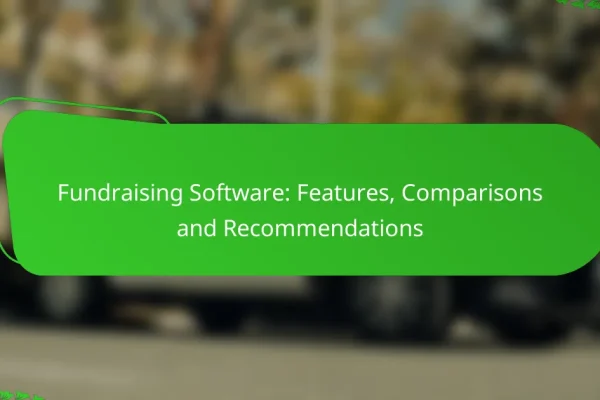How to effectively fundraise for political causes in the US?
To effectively fundraise for political causes in the US, focus on leveraging multiple channels to reach potential donors. Combining online platforms, community engagement, social media, and partnerships can significantly enhance your fundraising efforts.
Utilize online crowdfunding platforms
Online crowdfunding platforms are essential tools for political fundraising, allowing campaigns to reach a broad audience quickly. Websites like GoFundMe, Kickstarter, or specialized platforms like ActBlue enable supporters to contribute easily, often with minimal fees.
When using these platforms, create compelling campaign narratives and set clear funding goals. A well-crafted video or story can increase engagement and donations significantly. Aim for a target that reflects your campaign needs, typically ranging from a few thousand to tens of thousands of dollars.
Engage local community events
Local community events provide excellent opportunities to connect with potential donors face-to-face. Hosting or participating in town halls, fairs, or fundraisers can build relationships and foster trust within the community.
Consider organizing events that align with your campaign’s values, such as charity runs or community service days. These events not only raise funds but also increase visibility and support for your cause.
Leverage social media campaigns
Social media is a powerful tool for reaching and engaging voters. Platforms like Facebook, Twitter, and Instagram allow campaigns to share updates, rally support, and solicit donations directly from followers.
Develop a content strategy that includes regular posts, live Q&A sessions, and targeted ads. Engaging visuals and clear calls to action can enhance your fundraising efforts. Aim for a consistent posting schedule to keep your audience informed and involved.
Form partnerships with advocacy groups
Partnering with advocacy groups can amplify your fundraising efforts by tapping into their established networks. These organizations often have dedicated supporters who are passionate about similar causes, making them ideal allies.
Collaborate on events, share resources, and cross-promote campaigns to maximize reach. Ensure that the partnership aligns with your campaign values and goals to maintain credibility and support among your base.
What are the best practices for political fundraising?
The best practices for political fundraising include setting clear goals, crafting a compelling narrative, and effectively segmenting your donor base. These strategies help maximize contributions and engage supporters meaningfully.
Establish a clear fundraising goal
Setting a clear fundraising goal is essential for guiding your campaign’s efforts. A specific target, such as raising $50,000 within three months, provides a benchmark for measuring progress and motivates both the team and potential donors.
When defining your goal, consider the overall budget needed for your campaign, including advertising, events, and operational costs. Ensure your goal is realistic yet ambitious enough to inspire action.
Build a compelling narrative
A compelling narrative connects with potential donors on an emotional level. Share your campaign’s vision, values, and the impact their contributions will make. Personal stories and testimonials can effectively illustrate the importance of your cause.
Utilize various formats, such as videos, social media posts, and newsletters, to communicate your narrative. Consistency across all platforms reinforces your message and builds trust with your audience.
Segment your donor base
Segmenting your donor base allows for tailored communication strategies that resonate with different groups. Consider factors such as donation history, demographics, and engagement levels to create targeted messaging.
For example, high-value donors may appreciate exclusive updates and invitations to special events, while smaller donors might respond better to regular progress reports and calls to action. This personalized approach can enhance donor loyalty and increase overall contributions.
What are the legal requirements for political fundraising?
Legal requirements for political fundraising vary by jurisdiction but generally include compliance with federal and state regulations regarding contributions and reporting. Understanding these laws is crucial to ensure that fundraising efforts are lawful and effective.
Comply with FEC regulations
The Federal Election Commission (FEC) oversees federal political fundraising and sets limits on contributions from individuals and organizations. For instance, individuals can contribute up to a specific amount per election cycle, while corporations and foreign entities are prohibited from contributing directly to candidates.
Campaigns must also file regular financial reports detailing contributions and expenditures. Failing to comply with FEC regulations can result in fines and legal challenges, so it is essential to maintain accurate records and report on time.
Understand state-specific laws
Each state has its own laws governing political fundraising, which can include different contribution limits, registration requirements, and reporting schedules. For example, some states may allow contributions from corporations under certain conditions, while others strictly prohibit them.
It is vital to research and understand the specific regulations in your state to avoid potential legal issues. Consulting with a legal expert in campaign finance can help ensure compliance with all applicable state laws.
How to choose the right fundraising platform?
Choosing the right fundraising platform involves assessing your campaign’s specific needs, including budget, features, and audience engagement. A well-suited platform can enhance your fundraising efforts and streamline the donation process.
Evaluate platform fees and features
When evaluating fundraising platforms, start by examining their fee structures. Most platforms charge a percentage of the funds raised, typically ranging from 2% to 5%, along with transaction fees that may vary based on payment methods. Understanding these costs is crucial to ensure that your campaign retains as much funding as possible.
Additionally, consider the features offered by each platform. Look for tools that facilitate donor engagement, such as customizable donation pages, social sharing options, and analytics for tracking campaign performance. Some platforms may also offer integrated marketing tools, which can be beneficial for outreach.
Consider user experience and support
User experience is vital for both fundraisers and donors. A platform should have an intuitive interface that makes it easy for users to navigate, donate, and manage their campaigns. Test the platform yourself to ensure it meets your expectations and is user-friendly.
Support services are equally important. Check if the platform provides reliable customer support through various channels, such as live chat, email, or phone. Having access to prompt assistance can help resolve issues quickly and keep your fundraising efforts on track.
What are the common challenges in political fundraising?
Political fundraising often faces several challenges that can hinder success, including donor fatigue and compliance issues. Understanding these obstacles is crucial for developing effective strategies to overcome them.
Overcoming donor fatigue
Donor fatigue occurs when potential contributors become overwhelmed by frequent requests for financial support, leading to decreased engagement. To combat this, political campaigns should focus on building long-term relationships with donors rather than relying solely on constant appeals for funds.
One effective strategy is to diversify fundraising methods, such as hosting events, utilizing social media, and creating engaging content that resonates with supporters. Offering exclusive updates or behind-the-scenes access can also rekindle interest and encourage ongoing contributions.
Navigating compliance issues
Compliance issues in political fundraising involve adhering to various regulations regarding donations, reporting, and transparency. Each country has its own set of rules, and understanding these is essential to avoid legal pitfalls and maintain donor trust.
Campaigns should establish a robust system for tracking contributions and expenditures, ensuring all donations are reported accurately and on time. Consulting with legal experts familiar with local laws can help navigate complex regulations and ensure compliance throughout the fundraising process.
How to measure the success of fundraising efforts?
Measuring the success of fundraising efforts involves evaluating both financial outcomes and donor engagement. Key metrics include total funds raised compared to targets and the level of participation from supporters.
Track donations against goals
To effectively track donations against goals, set clear, measurable targets for your fundraising campaign. For instance, if your goal is to raise $50,000, monitor progress regularly to see how much has been collected and how close you are to achieving that target.
Consider breaking down the overall goal into smaller milestones, such as weekly or monthly targets. This approach helps maintain momentum and allows for adjustments in strategy if you’re falling short.
Analyze donor engagement metrics
Analyzing donor engagement metrics is crucial for understanding how effectively you are connecting with your supporters. Key metrics include the number of donations, average donation size, and donor retention rates. For example, tracking how many first-time donors return for subsequent campaigns can provide insights into your engagement strategies.
Utilize tools like CRM systems to gather data on donor interactions, such as email open rates and event attendance. This information can help refine your outreach efforts and improve future fundraising initiatives.
What role does grassroots mobilization play in fundraising?
Grassroots mobilization is crucial for fundraising as it engages local communities and builds a strong support base. By leveraging personal connections and shared values, campaigns can significantly increase their fundraising potential and reach.
Enhances community support
Grassroots mobilization enhances community support by fostering a sense of ownership among local constituents. When individuals feel directly involved in a cause, they are more likely to contribute time and resources, leading to increased donations and volunteer efforts.
Effective grassroots efforts often include organizing local events, door-to-door canvassing, and utilizing social media to spread awareness. These activities not only raise funds but also strengthen community ties and create a network of advocates who can further promote the cause.
To maximize community support, campaigns should focus on clear messaging that resonates with local values and concerns. Engaging storytelling and transparent communication about how funds will be used can motivate individuals to contribute, often leading to donations that range from small, recurring amounts to larger one-time gifts.









